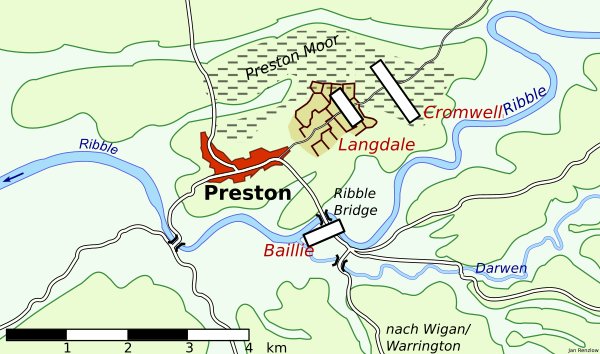The Battle of Preston
The Battle of Preston destroyed the Royalists’ chances of success in the English Civil War. The victory of the Parliamentarians under the command of Oliver Cromwell over the Royalists and Scots commanded by the Duke of Hamilton, meant it was the last battle of the English Civil War.
In April 1648, Marmaduke Langdale had led a group of Scots across the border to capture Berqick and Carlisle. On 8 July, the Marquis of Hamilton commanded a larger force into into Carlisle. This meant that by July, men were prepared to march south in support of the Royalist cause However, Scottish advance experienced delays which allowed the Parliamentarian force to cross the Pennines east to attack the invaders.
After Pembroke Castle fell to Cromwell on 11 July, more men were available to march north and support Lambert.

However, the Parliamentarian forces faced a stronger amy. Hamilton’s troops numbered 20,000, while Cromwell only had 9,000.
But Cromwell’s smaller army was disciplined, putting it in a superior position to the Scots’ army, which was dispersed over 20 miles. Although Hamilton’s cavalry had the advantage of travelling by horse, the units were disorganised and the terrain was not conducive to speedy travel. what’s more, the rain made the ground boggier than normal.
On 17 August Cromwell launched an attack on the infantry at the rear of Hamilton’s army.
The fighting in Preston was vicious. Hamilton soon realised that keeping his force dispersed over such a large distance was a big mistake. The fighting on 17 August at Preston killed thousands of the Scots’ troops.
The night of 17 August was extremely wet and the Scots who were still in the field were suffering from the damp and hunger. About 4,000 Scots laid down their weapons at Warrington instead of fighting a smaller Parliamentarian force. Hamilton surrendered his forces at Uttoxeter to John Lambert when his men refused to march.
Those soldiers who had volunteered to join Hamilton’s army were harshly treated by the Parliamentarian army. Many were sent as virtual slaves to the plantations in Barbados and Virginia. Those conscripted into the army were sent home.
The battle was a huge setback for Charles, who had lost his power-base in England, Wales, Ireland or Scotland.
See also:
MLA Citation/Reference
"The Battle of Preston". HistoryLearning.com. 2026. Web.
